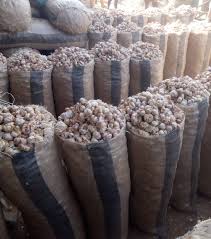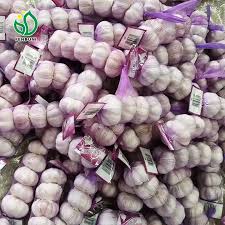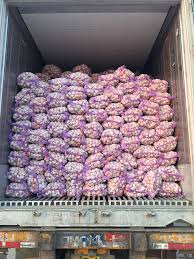![]()
If you’ve landed on this article page, you’re probably searching for a
good business idea—an idea that’s light on the pocket but heavy on
returns, promising both a fulfilling journey and potential profit.
|
How To Export Garlic From Nigeria
Nigeria, with its favorable climatic conditions and suitable
soil types, has emerged as a significant player in the garlic
industry. The country has the potential to become a leading
exporter of garlic due to its abundant resources and growing
demand in international markets.
Fresh garlic is abundant in Nigeria as it is cultivated in large
quantities in Nigeria especially in the Northern regions such as
Kano, Kaduna, Kebbi, Sokoto, Jigawa, Bauchi, Katsina and Zamfara
States. The estimated national production statistics for garlic
production is about 150,000 metric tonnes with Sokoto State
producing over 30% of the entire value.
Garlic export from Nigeria offers numerous benefits for the
country's economy. It contributes to foreign exchange earnings,
job creation, rural development, and agricultural
diversification. By tapping into the international garlic
market, Nigeria can showcase its agricultural prowess and
increase its global competitiveness. Additionally, garlic export
can enhance trade relations, foster international
collaborations, and strengthen the country's overall economic
growth.
Registration and Licensing: Before exporting garlic, Nigerian
exporters must register their businesses with relevant
government agencies, such as the Corporate Affairs Commission
(CAC) and the Nigerian Export Promotion Council (NEPC).
Obtaining an export license from the NEPC is mandatory for
exporting agricultural products, including garlic. Additionally,
exporters need to comply with other regulatory bodies such as
the National Agency for Food and Drug Administration and Control
(NAFDAC) for food safety requirements.
The local price of garlic ranges from about N250,000 to
N500,000/MT, depending on the time and location of purchase.
Sales of garlic and its processed products is very lucrative in
Nigeria as it is consumed in most households. The international
market for garlic is as well wide and profitable especially
because foreign countries depend on its import.
Garlic is transported and sold from Nigeria to other neighboring
countries like Cotonou and Benin Republic. The US is the world’s
largest import market for fresh garlic, followed by other
nations like Australia, Germany, France, Indonesia and Brazil.
Exporting the product to these countries is not difficult. All
you need is to be well prepared and comply to the strict
international standards guarding import and export.
With internationally certified good qualities of garlic, you are
assured of foreign hard currencies. You may be a wholesaler,
middleman, a broker merchant or an exporter and make millions
from it.
Preparing Export
Documentation: Export documentation includes various permits,
certificates, and forms that facilitate customs clearance and
comply with destination country requirements. Some essential
export documents for garlic include the Proforma Invoice, Bill
of Lading, Certificate of Origin, Phytosanitary Certificate, and
Commercial Invoice. Nigerian exporters must ensure accuracy and
completeness in preparing export documents to avoid delays or
rejection at the port of entry.
Customs and Shipping Procedures: Navigating customs and shipping
procedures is crucial for a successful export venture. Exporters
need to work closely with customs agents and shipping companies
to ensure proper handling, documentation, and compliance with
customs regulations. Understanding Incoterms (International
Commercial Terms) helps establish clear responsibilities and
liabilities between exporters and buyers regarding transport,
insurance, and delivery of goods.
Identifying Potential Buyers: Identifying and engaging with
potential buyers is crucial for successful garlic export. Market
research, trade directories, participation in trade missions,
and leveraging industry networks help identify importers,
wholesalers, distributors, and retailers interested in Nigerian
garlic. Establishing direct communication and building
relationships with potential buyers facilitate understanding
their requirements, negotiating export contracts, and ensuring
long-term partnerships.
Sorting, Grading, and Packaging: After curing, garlic bulbs are
sorted based on size, quality, and appearance. Sorting ensures
uniformity and consistency in the final product. Grading
involves categorizing garlic bulbs into different size
categories, such as jumbo, large, medium, and small, to meet
market demands. Finally, the sorted and graded bulbs are
packaged in appropriate materials, such as mesh bags or cartons,
to protect them during transportation and storage.
Global Garlic Market Overview: The global garlic market has
experienced significant growth over the years, driven by
increasing consumer awareness of its health benefits, culinary
uses, and demand for natural flavor enhancers. The market is
influenced by factors such as population growth, changing
dietary preferences, and expanding food processing industries.
Major garlic-producing countries, including China, India, Spain,
and the United States, dominate the global market.
Demand and Consumption Trends: Garlic enjoys a diverse range of
culinary applications, making it a popular ingredient worldwide.
It is used in various forms, such as fresh, dried, powdered, or
processed into oils and pastes. The growing awareness of
garlic's medicinal properties and its incorporation into
functional food products have also contributed to increased
demand. The global market offers opportunities for both raw
garlic and value-added garlic products.
Packaging and Labeling Requirements: Proper packaging and
labeling are essential for ensuring the safety, quality, and
traceability of garlic products. Export packaging should be
sturdy and provide adequate protection during transit. Labeling
requirements include accurate product information, country of
origin, batch or lot numbers, net weight, and any necessary
regulatory or nutritional labeling. Compliance with
international packaging and labeling standards helps build
consumer trust and facilitates trade.
Key Success Factors for Garlic Exporters: Identifying the key
success factors for garlic exporters helps aspiring
entrepreneurs and existing exporters enhance their chances of
success. These factors may include factors such as product
quality, market research, branding, supply chain management,
customer relationship management, and agility in responding to
market changes. Understanding and implementing these success
factors contribute to sustainable growth in garlic export.
Get our Practical Guide on Garlic Exportation in Nigeria. We will provide a comprehensive understanding of garlic export from Nigeria and insights into the various aspects of the industry.
|







